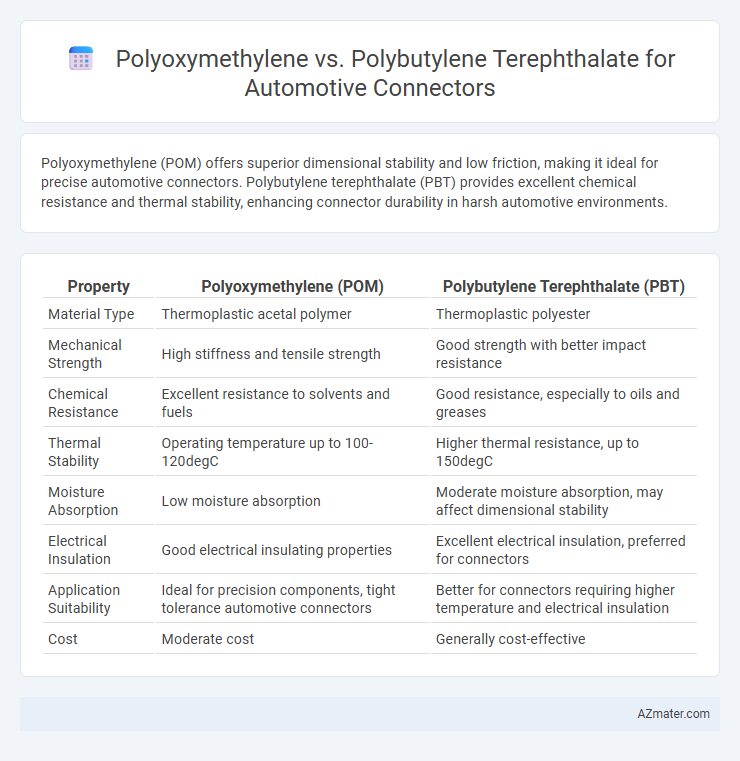Polyoxymethylene (POM) offers superior dimensional stability and low friction, making it ideal for precise automotive connectors. Polybutylene terephthalate (PBT) provides excellent chemical resistance and thermal stability, enhancing connector durability in harsh automotive environments.
Table of Comparison
| Property | Polyoxymethylene (POM) | Polybutylene Terephthalate (PBT) |
|---|---|---|
| Material Type | Thermoplastic acetal polymer | Thermoplastic polyester |
| Mechanical Strength | High stiffness and tensile strength | Good strength with better impact resistance |
| Chemical Resistance | Excellent resistance to solvents and fuels | Good resistance, especially to oils and greases |
| Thermal Stability | Operating temperature up to 100-120degC | Higher thermal resistance, up to 150degC |
| Moisture Absorption | Low moisture absorption | Moderate moisture absorption, may affect dimensional stability |
| Electrical Insulation | Good electrical insulating properties | Excellent electrical insulation, preferred for connectors |
| Application Suitability | Ideal for precision components, tight tolerance automotive connectors | Better for connectors requiring higher temperature and electrical insulation |
| Cost | Moderate cost | Generally cost-effective |
Introduction to Engineering Plastics in Automotive Connectors
Polyoxymethylene (POM) and Polybutylene Terephthalate (PBT) are key engineering plastics widely used in automotive connectors due to their excellent mechanical strength, chemical resistance, and dimensional stability. POM offers superior wear resistance and low friction properties, making it ideal for connectors subjected to frequent mating cycles and mechanical stress. PBT provides enhanced thermal stability and excellent electrical insulation, ensuring reliable performance in high-temperature engine compartments and demanding automotive environments.
Overview of Polyoxymethylene (POM)
Polyoxymethylene (POM), known for its high stiffness, low friction, and excellent dimensional stability, is widely used in automotive connectors requiring precision and durability. POM offers superior chemical resistance and fatigue endurance compared to Polybutylene terephthalate (PBT), making it ideal for connectors exposed to mechanical stress and harsh environmental conditions. Its inherent low moisture absorption enhances electrical insulation properties, ensuring reliable performance in automotive applications.
Overview of Polybutylene Terephthalate (PBT)
Polybutylene Terephthalate (PBT) is a highly durable thermoplastic commonly used in automotive connectors due to its excellent mechanical strength, chemical resistance, and thermal stability. PBT offers superior resistance to automotive fluids and high temperatures, making it suitable for under-the-hood applications where Polyoxymethylene (POM) may degrade more quickly. Its low moisture absorption and good dimensional stability enhance connector reliability in harsh automotive environments.
Mechanical Properties: POM vs. PBT
Polyoxymethylene (POM) exhibits superior tensile strength and stiffness compared to Polybutylene Terephthalate (PBT), making it highly suitable for automotive connectors that demand high mechanical durability. POM offers excellent fatigue resistance and dimensional stability under stress, while PBT provides better impact resistance and thermal stability but lower mechanical rigidity. The higher modulus of elasticity and wear resistance of POM contribute to enhanced connector performance in high-load applications within automotive systems.
Thermal Resistance and Stability Comparison
Polyoxymethylene (POM) exhibits excellent dimensional stability and thermal resistance with a melting point around 175degC, making it suitable for automotive connectors requiring precision and durability under moderate heat exposure. Polybutylene Terephthalate (PBT) offers superior thermal resistance, with a melting temperature near 223degC, and enhanced stability in harsh automotive environments, resisting hydrolysis and maintaining mechanical properties at elevated temperatures. PBT's higher thermal stability and resistance to chemical degradation make it preferable for connectors exposed to continuous high heat or aggressive fluids, while POM provides stiffness and low friction for applications with moderate thermal demands.
Chemical Resistance in Automotive Environments
Polyoxymethylene (POM) offers excellent chemical resistance to fuels, lubricants, and cleaning agents commonly encountered in automotive environments, ensuring durability in connector applications. Polybutylene terephthalate (PBT) also provides strong resistance to automotive chemicals but exhibits superior stability against hydrolysis and moisture absorption, which enhances long-term performance. For automotive connectors exposed to aggressive fluids and varying temperatures, selecting PBT can result in better resistance to chemical degradation and mechanical stress.
Electrical Performance for Connector Applications
Polyoxymethylene (POM) exhibits excellent electrical insulation properties and low dielectric constant, making it suitable for high-frequency automotive connector applications where signal integrity is critical. Polybutylene terephthalate (PBT) offers superior resistance to moisture absorption and thermal stability, ensuring reliable electrical performance under harsh automotive environments. PBT's higher dielectric strength compared to POM enhances its suitability for connectors exposed to elevated temperatures and electrical stress in automotive systems.
Processability: Injection Molding and Manufacturing
Polyoxymethylene (POM) offers excellent injection molding processability for automotive connectors due to its low melt viscosity and stable crystalline structure, enabling fast cycle times and high dimensional accuracy. Polybutylene terephthalate (PBT) provides superior flow characteristics and good thermal stability during injection molding, allowing for intricate connector designs with minimal warpage. Manufacturing automotive connectors with POM results in high stiffness and wear resistance, while PBT enhances chemical resistance and surface finish, influencing mold design and processing conditions.
Cost Efficiency and Sustainability Considerations
Polyoxymethylene (POM) offers high rigidity and low friction, making it cost-efficient for automotive connectors through reduced wear and longer lifespan, while Polybutylene Terephthalate (PBT) provides superior chemical resistance and thermal stability, enhancing durability in harsh environments. PBT's recyclability and lower environmental impact during production contribute to better sustainability profiles compared to POM, which often involves more energy-intensive manufacturing. Cost efficiency favors POM in high-volume applications due to lower raw material costs, whereas sustainability considerations prioritize PBT for reducing lifecycle emissions and meeting stringent automotive environmental standards.
Application Suitability: Choosing Between POM and PBT for Automotive Connectors
Polyoxymethylene (POM) offers excellent dimensional stability, low friction, and high mechanical strength, making it ideal for precision automotive connectors requiring durability and smooth mating surfaces. Polybutylene terephthalate (PBT) provides superior thermal resistance and chemical stability, suitable for connectors exposed to high temperatures and harsh automotive environments. Selecting POM or PBT depends on prioritized factors such as mechanical performance, thermal endurance, and exposure conditions in automotive connector applications.

Infographic: Polyoxymethylene vs Polybutylene terephthalate for Automotive connector
 azmater.com
azmater.com